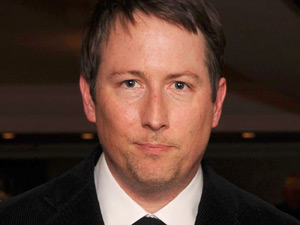 Joe Cornish is, for lack of a better term, totally legit.
Joe Cornish is, for lack of a better term, totally legit.
This should be quite evident to anyone who sees his debut feature Attack the Block, which smashed its way through SXSW and has been riding a steady wave of buzz ever since. Now that the film has distribution in the US via Screen Gems and a constantly swelling reputation as the most exciting creature feature since Critters, geeks across the web and the world are waiting to find out just exactly how, where, and when they’ll each get to see it. Many international dates are set, while US audiences wait to see what the date and scale of the stateside release will be. All I can say is that it should be soon and wide if Screen Gems knows what’s good for them, as they’ve picked up a truly brilliant film. (linked: my 5-star review)
As if you need any further convincing, I’m happy to bring you this excellent (spoiler-free) interview I was lucky enough to conduct with Writer/Director Joe Cornish not long after his film had debuted to such fanfare. We were joined by Todd Gilchrist who had not yet seen the film, but definitely contributed to the the conversation before he had to jet off. That is to say, this is not officially an exclusive interview, but it’s close.
Joe took time over burgers to discuss how Attack the Block came into being, what he did and didn’t do to prepare, along with a whole heap of insights into the state of filmmaking. As you’ll read, Cornish is an extremely sharp guy who is coming at every aspect of this thing with the right attitude. I walked away from this interview with the feeling that I was privileged to have shared lunch with a guy who will undoubtedly be a geek favorite, and who will surely be involved in some major films in the future. I can only hope he has as much time for CHUD when he’s gearing up for his $200m blockbuster franchise starter. Of course he’ll never need that kind of a budget to do good work, but he’s definitely worth it.
Enjoy!
—-
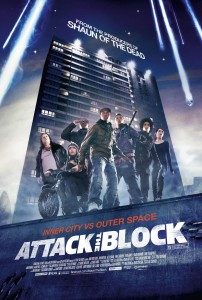 It was lunchtime in Austin, Texas and I was sitting in the lobby of a very fancy restaurant, waiting to have a burger with Joe Cornish. In the few minutes before Joe arrived, I said “hi” to Edgar Wright –executive producer on the film, and writing partner with Joe– as he entered to have his own lunch and I watched a towering Conan O’Brien leave the joint at nearly the same time (his documentary was premiering later that night). As I found out during the course of my first-ever visit to Austin, TX, that kind of shit just happens at SXSW. In any event, when he arrived and we sat down, Joe Cornish was still clearly riding high from the previous night’s screening, but you also got a sense of confidence and vindication. Obviously the guy knew he was coming to the festival with something special. Thunderous applause had followed the debut showing which was crackling with energy the entire runtime of the movie. We chatted about the experience a bit, and by the time I got my recorder on, the first question I asked was about the sound design of the film, which I praised highly.
It was lunchtime in Austin, Texas and I was sitting in the lobby of a very fancy restaurant, waiting to have a burger with Joe Cornish. In the few minutes before Joe arrived, I said “hi” to Edgar Wright –executive producer on the film, and writing partner with Joe– as he entered to have his own lunch and I watched a towering Conan O’Brien leave the joint at nearly the same time (his documentary was premiering later that night). As I found out during the course of my first-ever visit to Austin, TX, that kind of shit just happens at SXSW. In any event, when he arrived and we sat down, Joe Cornish was still clearly riding high from the previous night’s screening, but you also got a sense of confidence and vindication. Obviously the guy knew he was coming to the festival with something special. Thunderous applause had followed the debut showing which was crackling with energy the entire runtime of the movie. We chatted about the experience a bit, and by the time I got my recorder on, the first question I asked was about the sound design of the film, which I praised highly.
Joe: Well I actually spent an extra two weeks on sound design, an extra week for mixing and an extra week for the creature sounds. It’s cool you picked up on that, that’s gratifying for me because I made a special effort.
Renn: It’s a tough thing to design a creature sound that doesn’t sound like something you’ve heard before, but you guys really pulled it off. On every level and every frequency there’s something unique going on when the creatures open their mouths.
Joe: Absolutely. Now, why do you know all this?
R: I’ve done sound work in the past.
Joe: Absolutely. Well Basement Jaxx, who did the music, they collaborated with this guy called Steve Price, and their music is very compressed, the sonic spectrum is very compressed, it occupies a very broad bandwidth so it was tricky to get a creature sound that would actually fit in the spectrum and punch through. In some sequences you would have the sound of fireworks, the sound of creatures screaming, and the music and you had to find a level where everything punched through. So yeah, it was tough. They did a good job, those guys.
Todd: It’s funny because we have all these groups- Basement Jaxx, Chemical Brothers, Daft Punk that are scoring movies. Is this just a coincidence or-
Joe: I have a theory about that. My theory is that traditional Hollywood movies scores have been hijacked by reality television, by The Apprentice, by American Idol. You hear the music from Requiem For A Dream, you hear Wes Anderson cues on The Apprentice. That music has been hijacked by reality television to give it a cinematic feel, and so suddenly movies are bereft of a unique sound. Plus it’s a return- you know, I remember Tangerine Dream doing Risky Business when I was a kid. When we were kids all that shit was the way to go to be experimental.
I also think there’s a bit of a plague of the needle drop in contemporary moviemaking and I was saying last night, I thin it affects a lot- it affects the editing rhythm, it affects your level of absorption into the movie, and it really gets on my tits this thing where you have 30 second of a famous record, you have the hook of a record to help lift a scene, and then if fades out and dialogue kicks in. For me it’s cheap, you’re buying a sense of connection, and the story should do that, not hearing the beginning or having the sense memory of your favorite record.
It’s not always the case- in some movies they’re very very well used. Wes Anderson and some people are brilliant, But I think too much of the time… I just miss old school scores, and I miss the energy of a experimental, weird score.
Todd: How did you formulate that collaboration so that it was what you needed…
Joe: Well they worked with this brilliant guy called Steve Price [IMDB] who was the music supervisor on Scott Pilgrim, worked with Edgar and he worked on the Lord of the Rings films, and he’s a brilliant guy. He was looking for his first opportunity to compose a score, and I’m sure you know when you do what Steve does you might work for a name composer and you might end up writing more minor cues in the style of that composer. Often the credited composer will write the theme and the main cues, but then he will get guys that work with him. So you end up with these super experienced, talented people who are on the cusp of composition and because of our budget and we wanted to make it all feel fresh we just though Steve would do it for this money if we let him compose it, and plus we can use all of his brilliant corralled pop musicians.
You know on Scott Pilgrim he was working with Nigel Godricht and Beck and all those different bands and pop musicians. And being a pop musician is a different thing, right? When you make a movie it’s like school, you’re on a schedule. Pop musicians can be a little bit, “Ah, let’s get started after lunch, and we’ll deliver when we deliver.”
R: I think it’s a great trend, since you’re combining the customization of traditional scores that emotionally conform and follow the edit, with that pop music sensibility.
Joe: Yeah, all the needle drop music [in Attack the Block] is what they call diegetic, as opposed to non-diegetic. It’s all motivated by character.
[Meaning: present in the scene, and heard by the characters.]
We then moved onto to talking more about how the film came together, what Joe’s influences have been, and how he prepared for taking on this challenge.
R: You and Edgar both sport styles that aren’t directly comparable, but have a similar grasp of kineticism and a sophisticated handle on action. Has Edgar influenced you at all in that respect?
Joe: Weirdly, I didn’t look at any films or copy any shots- I did it all instinctively. I just storyboarded it instinctively. Which probably means that subliminally some influences have come through, and I enjoy a lot of Edgar, but I would have been crazy to copy Edgar’s style. That would have been a foolish thing to do, so I tried to be more… Edgar does amazing things with cuts and whip-pans and juxtapositions and I tried to be a bit more traditional I suppose.
R: Certainly- it’s a completely different approach, but with a similar understanding of energy and dynamics.
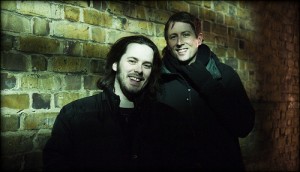 Joe: Actually, I think Edgar’s been a bigger influence on my writing- I’m one of these guys that’s been wanting to write screenplays since I was 13. My life is littered with first acts and last acts and no middle acts. And it was writing Ant-Man with Edgar, the first draft of Ant-Man, that taught me how to push through and connect the two to create a middle act. And doing that sort of broke my block – I did all the McKee courses, I read all the books, but it just gave me writer’s block or made it feel like astronomy or higher math. For me those courses make you feel like everything you write is wrong, because you have to compare it to this weird curve. I think it’s useful to read that stuff and do it, but then I think you have to absorb it, forget it, let it sit in your subconscious, not let it rule your life. And Edgar helped liberate me from that stuff.
Joe: Actually, I think Edgar’s been a bigger influence on my writing- I’m one of these guys that’s been wanting to write screenplays since I was 13. My life is littered with first acts and last acts and no middle acts. And it was writing Ant-Man with Edgar, the first draft of Ant-Man, that taught me how to push through and connect the two to create a middle act. And doing that sort of broke my block – I did all the McKee courses, I read all the books, but it just gave me writer’s block or made it feel like astronomy or higher math. For me those courses make you feel like everything you write is wrong, because you have to compare it to this weird curve. I think it’s useful to read that stuff and do it, but then I think you have to absorb it, forget it, let it sit in your subconscious, not let it rule your life. And Edgar helped liberate me from that stuff.
Later, Joe talked more about the influence he did allow on his writing- specifically the economy of John Carpenter’s films…
Joe: I studied Halloween and Assault on Precinct 13 pretty hard before I shot my film, when it came to writing dialogue. I noticed that those movies do not have expositional dialogue, there’s no point at which a character tells you some story from their past that is illustrative of some mental problem, there’s no point when they tell you where they’re going to tomorrow or how they feel about their Dad. Halloween is totally utilitarian, it’s “oh, my homework tonight” “where are you going tonight to eat?” -it’s just casual chitchat, and it makes it better, it makes it scarier.
Assault on Precint 13, you don’t know what the guy is the cellar has done, you don’t know what the crime he’s done is, you really know very little about anybody- they react to the moment. I took that as an inspiration and that’s another thing that helped liberate me, in terms of writing dialogue. Just to make it real and that might be good enough. I think less is more. Sometimes the more you know about a character, the more you know they’re not you. For me, the more natural and low-key it is the more you can kind of engage with them.
Renn: A great performance can be ruined by being saddled with too much dialogue, but a great performance can thrive on very little dialogue.
Joe: Yes. And pinned up on my pinball machine is an interview with Phillip Kaufman and he has that famous thing- make your scripts as short as possible, because it will be torture to shoot. It’s piss easy to write, but it will kill you to shoot it. And you’ll find a whole page of dialogue can be done in a look. And I pinned that up on my wall because it just helps you to boil the script right down. I love Walter Hill’s writing, because it’s like a haiku, it’s so minimalist. And when you’re actually writing something you’ve got to direct, and every word you write you realize is going to have practical implications. I love the minimalist John Carpenter thing, he’s got such control over everything in those films, there’s not a scene or a shred wasted. It doesn’t feel like he’s trying to get your empathy or your attention. You just go with him, don’t you? And you kind of lock into it. Short as well.
The ending of Halloween– they kill the shape, Loomis looks over, and then they just cut to empty streets and all the rooms they’ve been in to terrifying music. And then it just ends. It’s this really brutal ending. He’s still out there.
Renn: I love that in 70s cinema especially. You tell your story, when it’s done, the movie is done. Period, punctuation mark, no bullshit. Story’s done, you’re done.
Joe: Audiences detect that as well, even though they may not have any sense of screenwriting structure, they know instinctively when the top-plot has ended, and they’ll know exactly the word of dialogue that ties up the plot, and they’ll get up and go.
Renn: Yeah, everybody knows that moment when they’re gonna start putting their shoes back on or grabbing their purse.
Joe: You just feel it, don’t you? You feel it. You feel what the main theme is, when it’s been resolved, and sometimes when that’s resolved before the subplots.
The conversation then moved to the logistics of filming, and the development of something very specific and special about the film- it’s aliens.
Todd: Where did your budget limitations force you to be creative?
Joe: …I guess the creatures were the biggest thing, because we couldn’t afford CGI, so we had to figure out a lo-fi way of doing those. But my background– I did this show in the UK called “The Adam & Joe Show” and it was all homemade, like Robot Chicken before Robot Chicken. And Robot Chicken has a big team of animators and we didn’t, we just had the two of us. So that was how I trained- I learned to do it all myself. So that wasn’t weird for me, that was exciting. I just thank God the creatures worked okay.
Renn: How many iterations of the design were there?
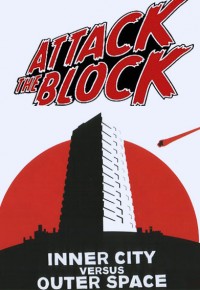 Joe: Not many. I had the idea, we tested it, it seemed to work, we built it, designed it. It was when I figured out how we could do those creatures that I figure the film was feasible, and then when I met Terry Notary on the set of TinTin– this movement coach who worked with Simon and Nick on TinTin.
Joe: Not many. I had the idea, we tested it, it seemed to work, we built it, designed it. It was when I figured out how we could do those creatures that I figure the film was feasible, and then when I met Terry Notary on the set of TinTin– this movement coach who worked with Simon and Nick on TinTin.
Renn: I looked him up- he’s done a lot of good work.
Joe: Yeah, he’s a cool dude. And when I met him on TinTin it was like God saying, “This is doable.” So the first thing we did was sign him, and he worked with Spectral to design the suit based on my designs, my illustrations. Then we worked with Double Negative and this effects company called Effetto. And yeah, it was all pretty much one idea that we tested and it worked out and we stuck to it.
Renn: I noticed, that due to their visual nature you were able to use them in transitions in a great way.
Joe: Well I always imagined it like a graphic novel, I imagined it on the printed page, and I imagined a field of black and what you could do with that. I very much thought that since they’re two-dimensional shapes, for me it pulled the whole image into a graphic novel panel and I just thought of the composition in two-dimensions.
I mention a little bit more about an usual effect of the design that gives the creatures a unique “alien” sensibility, prompting Joe to say-
Joe: I kind of don’t want to talk too much about it, to preserve the sense of mystery. I remember seeing Predator when it first came out and I had no idea that it was a monster movie. I actually saw it in Paris when I was a teenager, when it was out in Paris before it was out in London, and we didn’t know what it was about- we thought it was a war movie! And the creature reveal is so slow. It’s a little bit of blood, a POV, the laser target, the cloaking device, the wrist, a sound. They pay it out like a length of rope, slowly and slowly. And imagine how that would have hit out if you didn’t know it was a monster movie- it was incredible. So by the last act you’re now seeing that now-famous creature design for the first time. They’ve withheld it till the last flippin’ act, and you’re seeing Schwarzenegger go toe-to-toe with it. We flipped our lids, it was amazing. So it would be lovely to try and retain a little bit of that mystery. Not to say my film is anything as good like Predator.
The conversation shifted back to some of the arguable deficiencies of the modern filmmaking industry, which led to some interesting insight from Joe about what his ultimate goal as a filmmaker truly is.
Joe: I see fewer and fewer anti-heroes in movies, because I think development guys are obsessed with making the lead character appealing in the first act.
Todd mentions Scott Pilgrim as an example of a recent anti-hero.
Joe: Absolutely, and Edgar got some schtick from that, didn’t he? He got some schtick- “why’s this kid going out with this young girl? Why’s he so unpleasant to knives?” You’d be in terrible trouble if you applied that to the history of Modern literature, you’d lose the vast majority of great works of arts and literature.
And it used to be about weakness, didn’t it? I mean Indiana Jones was weak and cowardly and afraid of snakes and would take the easy option, Han Solo would take the easy option. Even Shaun in Shaun of the Dead- he’s letting his girlfriend down and he’d rather be with his friends.
Renn: It’s an odd trend, considering how much of culture has become wrapped up in fetishizing and observing the most loathsome fucking people imaginable, going back to reality TV and all that. It’s bizarre that cinema has reached such a different place.
Joe: I think it’s a marketing thing. Sometimes I feel –and this isn’t me being an opinionated director, this is just me as a consumer– I feel films have become either completely family movies or really unpleasant horror films or very stupid comedies. You don’t get stuff that’s like 48 Hours, that’s a really great thriller with laughs. People don’t seem to be able to, I don’t know-
Renn: It’s like they all have to be able to fit into predesigned marketing templates.
Joe: Right, your quadrants and “who will it play to?” and then if it tests well with the audience lets make it test mega-well with the audience, by stripping away. In a way that’s what Pixar does so well, is they do family movies but somehow they manage to creep all that old school emotion and drama and fear and stuff in. It was around the Grindhouse period actually when Quentin and Robert Rodriguez were making Grindhouse and there was something liberating about the attitude towards that as well. They just do what they want to do and to hell with the people who have formulas. What works for them, they go for it.
Todd: That movie though might be an example of where a few more constraints might have forced them to sharpen their ideas, rather than turning it into two full movies…
Joe: But man I like that, I found that liberating. I think Grindhouse was weirdly, massively successful because they’ve made two Grindhouse films- they’re obscure, they’ll be discovered, they’ll be played late night. The idea that’s weird to me is the idea that it would have been a massive commercial hit. They successfully made two quirky, peculiar, eccentric, brilliant, weird, genius movies that have flaws, but have amazing quirky strengths.
Renn: For a pair of film that were considered a failure, they’ve certainly sparked a fetishizing of that whole aesthetic. More often i’s been aped and regurgitated without understanding what made it special in the first place, but it’s definitely sparked new material.
Joe: I’d be happy for my film to be the one- again, as a consumer I like the movies that aren’t marketed down my throat, and that a friend will be the one who says, “Man, have you seen…?” and it’s this amazing quirky little film, or that amazing film. I’ll order it on Amazon, get all excited, and then I’ll dig it and champion it to my friends. Those are the films you feel you’ve discovered. I’d be happy enough if my film was one of those. The theatrical release is not the whole story, and a film is what it is, and Scott Pilgrim exists in the world, it’s an extraordinarily wonderful film with a density of workmanship and ideas that will last.
Renn: I’ve got the Blu-ray, and they can never ever take it away from me.
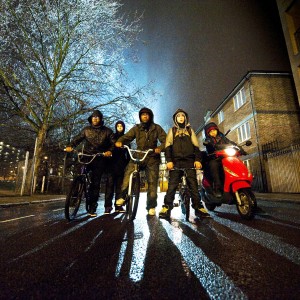 Joe: You know what? Yeah, exactly. As a filmmaker, that’s what you care about. You do your best to make as good a movie as possible, and the rest of it is sort of out of your hands. People have given you a lot of money. Whether you’re making a low-budget film or a big budget film, whatever, it’s still a lot of money and you can only control things to a certain extent. When it comes to marketing and things, that where your power as a filmmaker starts to wane. Yeah, you have a voice, but these people have bet a lot of money on you and you can’t blame them for trying to make it back in whatever way they feel is right.
Joe: You know what? Yeah, exactly. As a filmmaker, that’s what you care about. You do your best to make as good a movie as possible, and the rest of it is sort of out of your hands. People have given you a lot of money. Whether you’re making a low-budget film or a big budget film, whatever, it’s still a lot of money and you can only control things to a certain extent. When it comes to marketing and things, that where your power as a filmmaker starts to wane. Yeah, you have a voice, but these people have bet a lot of money on you and you can’t blame them for trying to make it back in whatever way they feel is right.
Renn: If there’s any push or enthusiasm or focus on box office from, at least from the online community I’m aware of, it’s because we like to see visionary, exciting filmmakers empowered. In the case of Scott Pilgrim– I saw it (twice), I own it, it’s mine, whatever. But I do feel some investment in the returns of the film because I want to see Edgar have the resources to realize more of his visions.
Joe: And that’s the great thing about the online world, it didn’t exist twenty years ago and filmmakers were totally relying on print journalists. That’s whats so exciting about being here, doing all these interviews, and you guys -online people- feel like the audience. You know what I mean? You don’t feel like you have an axe to grind, or you don’t feel competitive. Especially in America. Britain is quite led by the head, and it seems more led by the heart here. Not necessarily in a bad way, it’s just a different set of values. British people are very keen to be analytical and distinguish themselves against each other by being different. Here it seems to be a lot more straightforward and passionate- I dunno.
That’s the great thing about the filmmaking industry isn’t it? You kinda have to start with little, and everybody gets tested in the crucible.
Renn: And it seems to be getting a little easier to make a sharp movie on a lower budget-
Joe: With technology being what it is. If you’re a decent filmmaker, you shouldn’t need the money- don’t you think? Just to finish a film is an achievement, and to have directed one… I used to rag on movies the whole time, like anybody does to just enjoy it like sports. But when you play, you realize that everybody, whether they’re doing well or badly, is working really hard. Edgar is brilliant at that- you have to push him very hard to be negative about anybody and I used to wonder why, and now I kind of know. It’s hard work.
It is hard work, and his has payed off. I can’t wait for you to see how.
DISCUSS THIS on the CHUD Message Board
&
Like / Share it on Facebook (above or below) if you think it’s great!